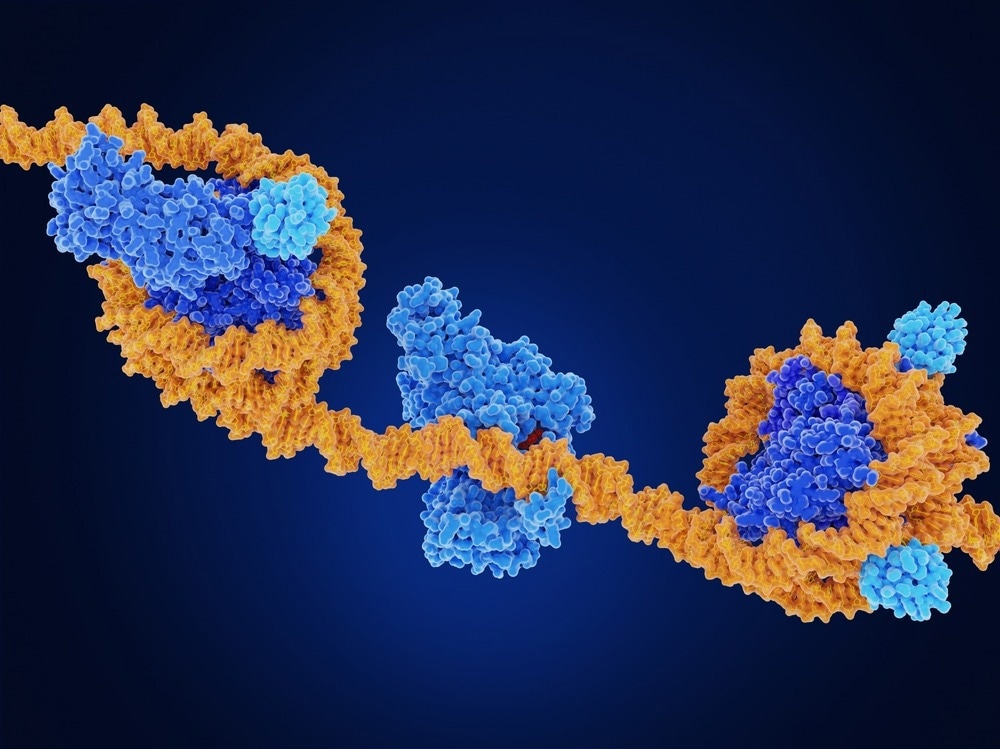What is epigenetics?
Epigenetic changes in cancer
Epigenetics in cancer diagnosis
Epigenetics in cancer treatment
References
Further reading
Epigenetics plays a vital role in cancer research, helping to understand the difference in nuclear organization, DNA methylation, and histone modification patterns between cancer cells and normal cells.

Image Credit: Juan Gaertner/Shutterstock.com
What is epigenetics?
Epigenetics is the study of the impact of human lifestyle and environmental factors on gene expression patterns. Epigenetic changes are dynamic and reversible and inherited somatically. These changes affect the expressions of genes without changing their sequence.
Epigenetic changes can "turn on" or "turn off" a gene through various mechanisms, including DNA methylation, histone modification, and non-coding RNA.
DNA methylation refers to the transfer of a methyl group to a specific position on the DNA to modulate the recruitment of proteins that are vital for initiating gene expression. Generally, methylation blocks gene expression, and unblocking is done through demethylation.
Histones are chromosomal proteins wrapped by DNA. A tight packaging of histones prevents the access of gene expression-regulating proteins to DNA, inhibiting gene expression. A loose packaging of histones does the opposite action. Histone modification refers to adding or removing chemical groups from histone to regulate the tight or loose packaging of histones.
DNA sequences are transcribed to generate coding or non-coding RNA. While coding RNAs make proteins, non-coding RNAs control gene expression through various mechanisms.
Epigenetic changes in cancer
Epigenetic changes affect human health in many ways. Infection with specific microbes can induce epigenetic changes, which can suppress the immune system's functions. Nutrition is another important factor responsible for epigenetic changes. A woman's nutrition during pregnancy can alter the epigenetics of the baby and can make them more susceptible to certain diseases.
Epigenetic changes are associated with cancer development and progression. However, the reversible nature and somatic inheritability pattern have made epigenetic changes potential therapeutic targets. In cancer research, epigenetics is vital in early-stage cancer diagnosis, cancer type detection, and novel therapeutic design.
In cancers, global DNA hypomethylation is accompanied by hypermethylation in other regions. While hypomethylation induces the expression of oncogenes (pro-cancer genes), hypermethylation suppresses the expression of tumor suppressor genes. Collectively, these processes lead to the initiation and development of cancer.

Image Credit: Lightspring/Shutterstock.com
Epigenetic changes are also associated with cancer prognosis. Lower levels of histone post-translational modifications (methylation or acetylation) are associated with poor outcomes in prostate, lung, and kidney cancers. In contrast, higher levels of a specific histone modification (H3K9ac) are associated with lower survival in lung cancer.
MicroRNAs (miRNAs) are a type of non-coding RNA that bind to target mRNAs to inhibit their translation and subsequent protein synthesis. Since miRNAs play a vital role in gene expression regulation, any changes in their structure and function can lead to disease onset. Some miRNAs which exhibit oncogenic functions are called onco-miRs.
A reduction in miR-101 expression has been observed in many cancer types. This leads to increased expression of an enzyme responsible for histone methylation. Such induction in methylation in tumor suppressor genes can increase the risk of cancer development.
Epigenetics in cancer diagnosis
Early and accurate cancer detection is the major step toward successful cancer treatment. Targeted methylation sequencing is a promising approach that works by detecting abnormal methylation patterns associated with cancer development. The detection of promoter hypermethylation has gained considerable attention in cancer diagnosis.
Histone modification is another potential epigenetic biomarker used in cancer diagnosis. Detection of abnormal post-translational modifications in histones is an emerging approach for cancer diagnosis and outcome predictions. In lung cancer, specific histone modifications, such as lower H3 and H4 methylation levels, have been found to associate with poor prognosis and mortality.
miRNA methylation is a novel epigenetic biomarker in different cancers, including lung cancer. Hypermethylation of miR-124a and MiR-29 has been found to associate with poor prognosis in lung cancer.
Epigenetics in cancer treatment
Combined epigenetic therapies have shown promising outcomes in treating cancer patients, as tumorigenesis is associated with many epigenetic changes. Specific genetic and epigenetic changes associated with tumorigenesis should be accessed in each patient to get the highest benefits from these therapies.
In bladder cancer, the expression of tumor suppressor genes is inhibited by the polycomb repressive complex or de novo DNA methylation. Polycomb repressive complex-mediated suppression of expression can be treated with inhibitors of histone methyltransferase enzyme. Similarly, de novo DNA methylation can be blocked by inhibitors of DNA methylation.
Epigenetics & Cancer: The Other Side of the Coin
These epigenetic therapeutics can be combined with conventional chemotherapy to increase treatment efficacy. A combination of chemotherapy and epigenetic drugs has been found to reduce the growth of highly aggressive relapsed and refractory cancers, such as diffuse large B cell lymphoma. Epigenetic drugs also help increase the sensitivity of cancer cells to chemotherapy.
Cytotoxicity induced by high-dose chemotherapy can trigger epigenetic changes in cancer cells, such as DNA methylation and histone acetylation. This can lead to drug resistance. Treatment with inhibitors of these epigenetic processes can remove drug resistance and improve cancer prognosis.
References
Further Reading
Last Updated: Sep 23, 2024